词语知识点(可用)
三年级下册语文期末必备:词语知识汇总(形容+动词+量词专项练习)

1、填形容词(乌黑光亮)的羽毛(俊俏轻快)的翅膀(活泼机灵)的燕子(整整齐齐)的队伍(尖尖)的嘴巴(红色的)的爪子(灵活透亮)的眼睛(陡峭的)的石壁(清脆)的叫声(光彩夺目)的春天(美丽可爱)的世界(灿烂)的阳光(碧绿)的大圆盘(嫩黄色)的小莲蓬(洁白)的衣裳(可爱)的翠鸟(美丽)的鲜花(芬芳)的花香(清朗)的光辉(甜蜜)的微笑(绿茸茸)的草地(金灿灿)的金子(红艳艳)的花朵(黄澄澄)的稻田(白茫茫)的雾(黑乎乎)的山洞(红彤彤)的太阳(软绵绵)的沙发(绿油油)的禾苗(暖烘烘)的房间(雪白)的浪花(珍贵)的礼物(洪亮)的声音(坚强)的意志(严肃)的神情(清澈见底)的小溪(成千上万)的燕子结结实实的(橡树)天空(湛蓝深远)森林(郁郁葱葱)河水(清澈见底)空气(清新甜润)大雪(漫天飞舞)山路(弯弯曲曲)楼房上(彩旗飘扬)草地上(鲜花盛开)街道上(人山人海)马路上(人来车往)教室里(鸦雀无声)天空中(星光闪烁)竭尽全力地(救援)锲而不舍地(工作)聚精会神地(上课)七嘴八舌地(讨论)(认认真真)地看(开开心心)地唱(快快乐乐)地玩(老老实实)地画(慢慢吞吞)地走(吞吞吐吐)地说(目不转睛)地盯着(情不自禁)地欢呼(迫不及待)地开电脑(恋恋不舍)地离开(亲切)地说(安全)地航行美得(耀眼)乐得(精彩)(轻松)时间过得(飞快)节目表演得(精彩)吓得(心惊胆颤)(面如土色)2、填动词(掩饰)痛苦(停止)哭泣(购买)药品(皱着)眉头(握紧)拳头(画)杨桃(擦拭)酒精(商量)事情(讨论)总是(检阅)队伍(纠正)错误(鼓着)腮帮子(叨)小羊(劝)邻居(射)大雁(挺着)大肚子(瞪着)眼珠子(竖着)大拇指(拍)肩膀(耸)鼻子(举起)小手(伸)脖子(壮)胆子(换)衣服(拿)手杖(追)太阳(掩盖)痛苦(提)手袋(迈开)脚步(闭)眼睛(吸取)经验(抢救)生命(伸展)枝条(抄)生字(端)盘子(劝)朋友(种)庄稼(扛)大米(救)燕子(登)高山(燃烧)着熊熊大火(奔腾)着朵朵浪花(排除)忧伤(砍)树木(飘浮)着朵朵白云(增添)生机(发出)警报(打消)念头吓得(落荒而逃)(撒腿就跑)(四处逃窜)气得(七窍生烟)、(冒烟)3、填量词一(对)翅膀一(支)赞歌一(阵)风一(朵)荷花一(幅)画一(件)事一(片)花瓣一(首)歌曲一(缕)阳光一(身)羽毛一(眼)清泉一(双)小手一(束)金光一(串)珍珠一(把)斧头一(块)庄稼地一(个)山坡一(座)大山一(句)话一(条)小河一(张)嘴巴一(道)深沟一(场)大雨一(栋)楼房一(束)鲜花一(颗)牙齿一(列)火车一(面)红旗一(次)旅行一(台)电脑一(张)报纸一(件)衬衫一(篇)课文一(辆)车一(台)节目一(门)绝招一(杯)水一(轮)红日一(份)帐单一(条)公路。
三年级语文文言文常见词语知识点汇总(一).doc

导读:语文文言文阅读的方式主要还是在于对字词的理解能力,文言文与现代文不同,很多词语都有其独特的表达含义,学生在进行文言文练习时读不懂读不通,主要还是因为对句子中的某一个字不熟悉不认识,因此耗费了大量的时间去习惯阅读。本篇收集了一些文言文中常见的单个字的意思,帮助学生做好课外知识的收集,提高学习阅读效率,文言文在今后的学习中也是一个重点内容,所以学生可以提早起步,打好基础。
1、益:增加
2、趋:小步快走,古时臣下面见君主的一种礼节。
3、亡,通“无”,不(尖端)
4、失:离开(尖端)
5、谓:对……说。
6、市:市场
动词——做人质
9、加:更。
10、请以战喻中的请:请允许我。
行测知识点总结:言语理解选词填空必备186个成语汇总【推荐】
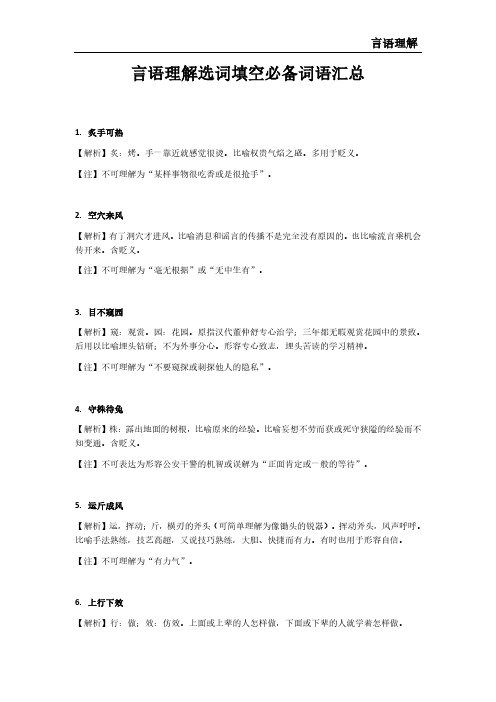
言语理解选词填空必备词语汇总1.炙手可热【解析】炙:烤。
手一靠近就感觉很烫。
比喻权贵气焰之盛。
多用于贬义。
【注】不可理解为“某样事物很吃香或是很抢手”。
2.空穴来风【解析】有了洞穴才进风。
比喻消息和谣言的传播不是完全没有原因的。
也比喻流言乘机会传开来。
含贬义。
【注】不可理解为“毫无根据”或“无中生有”。
3.目不窥园【解析】窥:观赏。
园:花园。
原指汉代董仲舒专心治学;三年都无暇观赏花园中的景致。
后用以比喻埋头钻研;不为外事分心。
形容专心致志,埋头苦读的学习精神。
【注】不可理解为“不要窥探或刺探他人的隐私”。
4.守株待兔【解析】株:露出地面的树根,比喻原来的经验。
比喻妄想不劳而获或死守狭隘的经验而不知变通。
含贬义。
【注】不可表达为形容公安干警的机智或误解为“正面肯定或一般的等待”。
5.运斤成风【解析】运,挥动;斤,横刃的斧头(可简单理解为像锄头的锐器)。
挥动斧头,风声呼呼。
比喻手法熟练,技艺高超,又说技巧熟练,大胆、快捷而有力。
有时也用于形容自信。
【注】不可理解为“有力气”。
6.上行下效【解析】行:做;效:仿效。
上面或上辈的人怎样做,下面或下辈的人就学着怎样做。
【注】不可理解为“群众以干部为榜样”。
7.一饭千金【解析】比喻厚厚地报答对自己有恩的人。
【注】不可理解为“饭食昂贵”或“挥霍无度”。
8.求田问舍【解析】本意是多方购买田地,到处问询房价。
比喻没有远大志向。
贬义词。
【注】不可理解为“归隐田野”或“安居生活”。
9.猫鼠同眠【解析】比喻官吏失职,包庇下属干坏事。
也比喻上下狼狈为奸。
【注】不可理解为“化敌为友”或“胸怀宽广”。
10.百里挑一【解析】一百个当中就挑出这一个来。
形容人才出众。
【注】不可理解为“人才极其缺乏”。
11.安土重迁【解析】土:乡土;重:看得重,不轻易。
安于本乡本土,不愿轻易迁移,形容留恋故乡。
【注】不可理解为迁徙。
12.空谷足音【解析】在寂静的山谷里听到脚步声。
比喻极难得的音信、言论或事物。
部编版小学语文三年级上册知识点归纳与看拼音写词语(田字格)
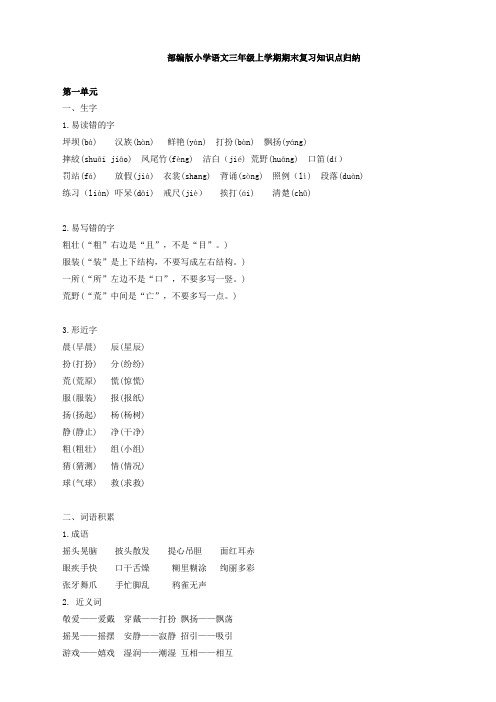
部编版小学语文三年级上学期期末复习知识点归纳第一单元一、生字1.易读错的字坪坝(bà) 汉族(hàn) 鲜艳(yàn) 打扮(bàn) 飘扬(yáng)摔絞(shuāi jiāo) 凤尾竹(fèng) 洁白(jié) 荒野(huāng) 口笛(dí)罚站(fá) 放假(jià) 衣裳(shang) 背诵(sòng) 照例(lì) 段落(duàn) 练习(liàn) 吓呆(dāi) 戒尺(jiè)挨打(ái) 清楚(chǔ)2.易写错的字粗壮(“粗”右边是“且”,不是“目”。
)服装(“装”是上下结构,不要写成左右结构。
)一所(“所”左边不是“口”,不要多写一竖。
)荒野(“荒”中间是“亡”,不要多写一点。
)3.形近字晨(早晨) 辰(星辰)扮(打扮) 分(纷纷)荒(荒原) 慌(惊慌)服(服装) 报(报纸)扬(扬起) 杨(杨树)静(静止) 净(干净)粗(粗壮) 组(小组)猜(猜测) 情(情况)球(气球) 救(求救)二、词语积累1.成语摇头晃脑披头散发提心吊胆面红耳赤眼疾手快口干舌燥糊里糊涂绚丽多彩张牙舞爪手忙脚乱鸦雀无声2. 近义词敬爱——爱戴穿戴——打扮飘扬——飘荡摇晃——摇摆安静——寂静招引——吸引游戏——嬉戏湿润——潮湿互相——相互碰触——碰撞照例——照常流利——流畅3. 反义词安静——喧闹古老——年轻粗壮——瘦弱洁白——乌黑热闹——冷清湿润——干燥认真——马虎详细——简略流利——生疏4.词语搭配(做)游戏(打)招呼(看)热闹(吹)口笛(穿)衣裳(跳)孔雀舞(扬起)手臂(收起)戒尺(提出)问题(朗读)课文(回到)座位(拍着)大手(敬爱)的老师(飘扬)的国旗(古老)的铜钟(粗壮)的枝干(洁白)的粉墙(鲜艳)的服装(欢唱)的小鸟(湿润)的东风(流利)地背出(好奇)地听着三、精彩文句1.同学们向在校园里欢唱的小鸟打招呼,向敬爱的老师问好,向高高飘扬的国旗敬礼。
词语知识点(可用)

词语知识板块词语知识点①能正确读写学过的常用词语,联系上下文理解其意思,大部分会用。
②能在一定语言环境中辨析近义词,能正确搭配使用。
③能按一定要求对词语进行逻辑归类。
主要题型如:(1)把词语补充完整,并解释所填字的意思(2)照样子写词语(3)根据意思写词语(4)用词造句(5)找近义词或反义词(6)选择恰当的词语(7)辨别每组词语中不是同一类的词(8)连线搭配词语等。
一、理解词语理解词语的方法:1、弄清这个词语中,两个关键性的字的意思,然后考虑整个词语的意思。
例“凝神谛听”这个词,其中“谛”是“仔细”的意思,整个词语的意思是“注意力仔细地听”。
2、有些词不能光从字面上去理解,要注意它们的比喻或引伸义。
例:“目瞪口呆”这个词常常用来比喻惊讶的样子,而不能只从字面上去理解。
3、要结合语言环境,联系上下文来理解词语的意思。
如:“这茶叶的香味吓煞人。
嫩叶如同一条青龙上下翻飞,煞是好看”。
前一个“煞”是“杀”的意思,后一个“煞”是“极”的意思。
二、辨析词义辨析词义的方法:1、要搞清词语的感情色彩。
例:“团结”和“勾结”,都有一个“为了一个目的联合和结合“的意思。
“团结”用于好的方面,而“勾结”用于坏的方面,指“进行不正当的活动而暗中结合”。
2、注意运用的对象。
如:“爱戴”和“爱抚”,前者用于党、领袖、英雄,后者用于老一辈对后代。
3、注意范围的大小。
如:“辽阔”和“广阔”,都是指面积广大,但辽阔比广阔所指的范围更大。
4、注意程度的轻重。
如:“喜爱”和“酷爱”,都有爱好某事某物之意,但“酷爱”比“喜爱”的程度重。
5、考虑词语搭配的习惯。
如“提高水平”,“改进方法”,“改善生活”等。
词语积累知识点①对义务教材中要求学上掌握的词语,进行系统复习,对学生易错易混淆的词语进行再次回顾、默写。
②掌握常用的成语、谚语和歇后语。
③了解构词规律,懂得各类词的特点,对词语进行归类。
叠词的形式有:AABB式干干净净整整齐齐风风雨雨风风火火堂堂正正偷偷摸摸轰轰烈烈ABAB式商量商量讨论讨论商量商量研究研究乐呵乐呵锻炼锻炼琢磨琢磨考虑考虑教育教育ABAC式有权有势大摇大摆AABC式恋恋不舍姗姗而来面面相觑面面俱到振振有辞窃窃私语息息相关ABCC式文质彬彬可怜巴巴热气腾腾人才济济书声琅琅神采奕奕生机勃勃ABB式静悄悄软绵绵明晃晃恶狠狠赤裸裸野茫茫红彤彤绿油油模仿词语结构,写词语的有:①什么—怎么样—什么—怎么样:头重脚轻语重心长②什么—怎么样:手脚发软四肢无力③并列的四种事物:天地山水花木禽兽④两个相关的动作相连:敲敲打打推推搡搡⑤由反义词组成的词语:顾此失彼有口无心⑥给一种状态程度加深的:烫——(滚烫)热——(火热)⑦事物—这种事物所呈现的色彩:瓦蓝梨黄⑧颜色—叠词:红彤彤绿油油⑨两个反义词组成的词语:出没涨落⑩两个近义词组成的词语:开放凋谢成语归类描写人的品质:平易近人宽宏大度冰清玉洁持之以恒锲而不舍废寝忘食大义凛然临危不俱光明磊落不屈不挠鞠躬尽瘁死而后已描写人的智慧:料事如神足智多谋融会贯通学贯中西博古通今才华横溢出类拔萃博大精深集思广益举一反三描写人物仪态、风貌:憨态可掬文质彬彬风度翩翩相貌堂堂落落大方斗志昂扬意气风发威风凛凛容光焕发神采奕奕描写人物神情、情绪:悠然自得眉飞色舞喜笑颜开神采奕奕欣喜若狂呆若木鸡喜出望外垂头丧气无动于衷勃然大怒描写人的口才:能说会道巧舌如簧能言善辩滔滔不绝伶牙俐齿出口成章语惊四座娓娓而谈妙语连珠口若悬河来自历史故事的成语:三顾茅庐铁杵成针望梅止渴完璧归赵四面楚歌负荆请罪精忠报国手不释卷悬梁刺股凿壁偷光描写人物动作:走马观花欢呼雀跃扶老携幼手舞足蹈促膝谈心前俯后仰奔走相告跋山涉水前赴后继张牙舞爪描写人间情谊:恩重如山深情厚谊手足情深形影不离血浓于水志同道合风雨同舟赤诚相待肝胆相照生死相依说明知事晓理方面:循序渐进日积月累温故知新勤能补拙笨鸟先飞学无止境学海无涯滴水穿石发奋图强开卷有益来自寓言故事的成语:自相矛盾滥竽充数画龙点睛刻舟求剑守株待兔叶公好龙亡羊补牢画蛇添足掩耳盗铃买椟还珠描写事物的气势、气氛:无懈可击锐不可当雷厉风行震耳欲聋惊心动魄铺天盖地势如破竹气贯长虹万马奔腾如履平地形容四季特点:春寒料峭春意盎然春暖花开满园春色春华秋实春风化雨骄阳似火暑气蒸人烈日炎炎秋风送爽秋高气爽秋色宜人冰天雪地寒气袭人寒冬腊月形容繁荣兴盛景象:济济一堂热火朝天门庭若市万人空巷座无虚席高朋满座如火如荼蒸蒸日上欣欣向荣川流不息描写美的景和物:美不胜收蔚为壮观富丽堂皇金碧辉煌玉宇琼楼美妙绝伦巧夺天工锦上添花粉妆玉砌别有洞天描写山水美景:锦绣河山高耸入云水天一色波光粼粼湖光山色重峦叠嶂山明水秀高山流水白练腾空烟波浩渺描写花草树木:繁花似锦绿草如茵郁郁葱葱古树参天万木争荣百花齐放花团锦簇万紫千红桃红柳绿绿树成荫描写日月风云:大雨如注滂沱大雨银装素裹皓月千里晨光熹微云雾迷蒙风清月朗春风化雨暴风骤雨风驰电掣带有近义词的成语:兴国安邦翻山越岭百依百顺背井离乡长吁短叹道听途说丢盔弃甲调兵遣将甜言蜜语眼疾手快带有反义词的成语:东倒西歪南辕北辙前赴后继前俯后继左推右挡承前启后舍近求远扬长避短弃旧图新优胜劣汰表示思考的词语:深思熟虑冥思苦想左思右想思前想后思深忧远若有所思一、补充成词风流()洒气()轩昂神()奕奕满面()光威风()()相貌()()温()尔雅心地()良风度()()()()大方一元()始万象()新桃()柳()芳草如()()阳似火暑气()人秋高气()万里()云涸波()渺一望无()岁月()流尺()寸阴水中()月海底()针风平()静雷霆万()抛好()()高屋建()排山()海旋()转()诗词歌()琴()书()人定()天风雪交()寒气()人波光()()高山()水炉火()青棋逢()()虎()龙()笔走()()一气()()生()妙笔()()如生头头是()娓娓而()()中开河()()其谈胡()乱()无()之谈海()天()拾人()()老生()()高朋满()()友如云()()生辉宾客()()一见如()一往()深相见恨()交()言()形影不()难舍难()情同()()一望而()一目()然得()应()左右逢()言()意()要言不()开()明义开门见()胸有()()意在()()浮想()()文思如()二、按要求写成语(至少五个)1、描写人物仪表的:2、反映人物优秀品质的:3、反映技艺高超的:4、反映朋友间情宜深厚:5、反映景色优美的:三、写近义词:开拓()气魄()和蔼()沉浸()暴躁()害羞()忙碌()惬意()闪烁()推荐()推辞()茂密()嗜好()适宜()寻常()安稳()折服()发掘()庄重()拾掇()搭救()珍惜()光阴()宽大()凝聚()憧憬()炽热()不屈不挠()五颜六色()转眼间()四、一词多义:⑴给下面带点的词语找近义词,说说它们的意思有什么不同。
部编版二年级上册语文词语及知识点

1.小蝌蚪找妈妈两(两条)(两只)(两头)哪(哪里)(哪个)(哪儿)宽(宽大)(宽广)(宽心)顶(山顶)(头顶)(顶尖)眼(眼力)(眼光)(眼角)睛(眼睛)(点睛)(目不转睛)肚(肚子)(肚皮)(鱼肚)皮(皮包)(皮衣)(皮毛)孩(孩子)(女孩)(男孩)跳(跳远)(跳高)(跳水)快活连忙已经1.了解小蝌蚪长成青蛙的过程:蝌蚪——长出后腿——长出前腿——尾巴变短——尾巴不见——变成青蛙。
2. 短语积累:大大的脑袋黑灰色的身子长长的尾巴碧绿的衣裳雪白的肚皮宽宽的嘴巴2 我是什么变(变身)(变样)(千变万化)极(北极)(极小)(南极)片(雪片)(叶片)(名片)傍(傍晚)(傍午)(依山傍水)海(大海)(海水)(海马)洋(海洋)(远洋)(太平洋)作(工作)(动作)(作用)坏(坏人)(坏处)(坏话)给(带给)(分给)(交给)带(皮带)(带来)(带鱼)天空花朵平常江河田地发动1.短语积累:发动机器灌溉机器淹没庄稼冲毁房屋伸出双手带来灾害披上红袍朗读课文2.水在自然界中以三种形态存在,分别是液态、固态和气态。
云、雨、雾、露是液态的水,冰、雪、霜、冰雹是固态的水,水蒸气是气态的水。
3.植物妈妈有办法法(方法)(办法)(书法)如(如果)(比如)(如今)脚(脚尖)(双脚)(脚跟)它(它们)(它的)娃(娃娃)(女娃)(娃娃鱼)她(她们)(她的)(她人)毛(皮毛)(毛豆)(九牛一毛)更(更加)(更好)(更美)知(无知)(知识)(知道)识(常识)(识字)(认识)告别四海为家出发那里植物妈妈传播种子的办法:1.靠水来传播:椰子、睡莲2.靠小鸟或其他小动物来传播:樱桃、野葡萄、野山参3.靠风来传播:柳树、蒲公英4.机械传播种子的办法,也叫弹射传播:凤仙花、酢浆草、芝麻、大豆识字1 场景歌园(花园)(校园)(公园)孔(气孔)(小孔)(孔子)桥(石桥)(大桥)(天桥)群(人群)(群山)(群众)队(队长)(队旗)(少先队)旗(红旗)(旗手)(国旗)铜(青铜)(铜号)(铜牌)号(口号)(问号)(学号)领(衣领)(带领)(本领)巾(毛巾)(头巾)(红领巾)欢笑背《量词歌》:一头牛,两匹马,三条鲤鱼,四只鸭,五本书,六支笔,七棵果树,八朵花,九架飞机,十辆车,用错量词出笑话。
期末总复习《词语解释》

2022《四字词语解释》第一单元光芒四射:强烈的光线射向四面八方。
顶天立地:形容形象高大,气概雄伟豪迈。
恍然大悟:一下子完全明白了或觉悟过来了。
烟波浩渺:形容江湖水面烟雾笼罩、广阔无边的样子。
乐此不疲:形容对某事特别爱好而沉浸其中。
相映成趣:互相衬托、映照而显得很有趣。
美妙绝伦:形容风景美丽,无与伦比。
颇负盛名:相当的有名声。
第二单元神机妙算:形容善于估计复杂的变化的情势,决定策略。
半夜三更:深夜。
请勿自务:请不要让自己受到伤害。
踉踉跄跄:指走路不稳,跌跌撞撞的样子。
喜不自胜:高兴得自己不能控制。
天造地设:事物自然形成,合乎理想,不必再加工。
抓耳挠腮:形容人心里焦急、苦恼、忙乱时无计可施的样子。
力倦神疲:肉体和精神上都疲乏疲惫。
人而无信,不知其可:一个人不讲信用,真不知道怎么能行。
指人不讲信用是不行的。
拱伏无违:抱拳举到头上,弯下身子。
表示毫无抵抗,全部顺从。
第四单元情不自禁:抑制不住自己的感情。
若有所思:好像在思考着什么。
一针见血:比喻文章、说话直截了当,切中要害。
从容镇定:表示面对任何事情能够做到淡定自若。
比较冷静。
一声不吭:指一直沉默不语,一句话也没有说过。
肃然起敬:形容产生严肃敬仰的感情。
矜持不苟:端庄严谨,毫不马虎。
第五单元半信半疑:有些相信,又有些怀疑。
天衣无缝:比喻事物周密完善,找不出破绽或漏洞。
露馅儿:比喻不愿意让人知道的事暴露出来。
手疾眼快:形容做事机警敏捷。
也说眼疾手快。
第六单元胸有成竹:比喻办事以前,已经有全面的设想和安排。
摩拳擦掌:形容战斗或劳动前,人们精神振奋、跃跃欲试的样子。
兴致勃勃:形容兴趣很浓厚,情绪很高涨的样子。
出谋划策:制定计谋策略。
多指为人出主意。
心惊胆战:形容十分害怕的样子。
第七单元纵横交叉:形容道路等交叉在一起。
操纵自如:掌握运用或驾驭得心应手,毫无阻碍。
手忙脚乱:形容做事慌张而没有条理。
仪态端庄:形容一个人的仪表姿态大方而且端正严肃,举动庄重。
悠然自得:形容悠闲而舒适。
故得新教育:初中语文知识点总结(词语解释)

故得新教育:初中语文知识点总结(词语解释)词语解释词语解释是初中语文试卷中常考的题目,这道题目虽然是一道比较基础的题目,但很难考得满分。
为了方便大家更高效率地复习,给大家整理了初中语文试卷中经常出现的词语解释,希望能够帮助到大家!(1)敬业乐群:对自己的事业很尽职,和朋友相处很融洽。
(2) 断章取义:意思是不顾上下文,孤立截取其中的一段或一句。
(3) 不二法门:佛教用语,指直接入道、不可言传的法门。
常用来比喻最好的或独一无二的方法。
(4) 强聒不舍:唠唠叨叨说个没完。
(5) 弥留之际:病重快要死了的时候。
(6) 媚上欺下:讨好巴结上级,欺负下级。
(7) 登峰造极:比喻达到顶峰。
(8) 恪尽职守:严格遵守,尽职尽责。
(9) 荒凉、冷落的意思。
萧索(10) 身体因寒冷而蜷缩或兼发抖。
瑟索(11) 心里好像失去了什么的样子。
惘然(12) 彼此思想感情不相通。
隔膜(13) 看不起。
鄙夷(14) 根深蒂固:比喻根基深厚牢固,不可动摇。
(15) 孜孜不倦:勤奋努力,不知疲倦。
(16) 不言而喻:不用说就可以明白。
(17) 一事无成,连一样事情也没做成,什么事都做不成。
(18) 锲而不舍:雕刻一件东西,一直刻下去不放手,比喻有恒心,有毅力。
(19) 持之以恒:有恒心地坚持下去。
(20) 比喻斟酌字句,反复琢磨。
推敲(21) 创造性的见解或意见。
创意(22) 某种事物的标准形式或使人可以照着做的标准样式。
模式(23) 还没有经过提炼和加工的原始材料。
素材(24) 格物致知;穷究事物的原理和法则,而总结出理性的知识。
(25) 袖手旁观:比喻置身事外或不协助别人。
(26) 不知所措:不知道怎么办才好。
(27) 一帆风顺:比喻非常顺利,毫无挫折。
(28) 文采藻饰:修饰文词,使之富有文采。
(29) 寻章摘句:搜寻、摘取文章的片断词句。
指读书局限于文字的推求。
(30) 味同嚼蜡:形容写文章或说话枯燥无味。
(31) 吹毛求疵:这里指细到烦琐、挑剔的地步。
词语派生 2

ent结尾的形 容词变成名词 改为ence 带“-ant”后 缀的形容词其 相应名词往往 是-ance或- ancy后 缀。 例如:
后缀
ment
例子 规律 development, amazement,excite ment,disappointm ent,treatment,arg 动词+ment变 umentjudgment,e 成名词 njoyment,astonish ment
词缀
规律 -less “- Homeless, regretless, less”加在名 less thoughtless, 词、动词后, hopeless, 表示“无”、 “缺”, Helpful, unhelpful, successful, un-ful unsuccessful,truthfu l.untruthful
译以-er、-or、-ar、-ist、-ess结尾表示人的名词 严钦熙 语境关照下的由动词派生的以-er(-or,-ar)结尾名词
词缀
dis
un
un
否定前缀 例子 规律 disloyal,disobey ,dissimilar,disa 动词、形容词、抽象名词 ble,disagree,dis 前构成否定或相反的意思 advantage,disab ility unimaginable, uninteresting,u un 主要加在im ,in,开头, ncomfortable,u able,ful,ed,-ing结尾的 nskillful,unexp 词,或者其他派生词。 ected,unending, uncover,unlock, 加在动词前表示相反动作 undress
例子
词缀
例子
规律
动词派生的名词以-ation,对应的形容词后缀为 able如.Adaption-adapt-adaptable 拼写规律:1. 原因字母+y结尾的词,保留y再 加able,如:buyable,enjoyable 2. 辅音字母+y结尾的词,通常去掉e再加able, Deniable,dutiable,justifiable,vari发音的e结尾的词,通常去掉e,再加 able,usable,forgivable,imaginable,analyzab le,,approvable,valuable, 4.以e结尾,但保留e作为辅助发音的词,直接 加-able,noticeable,liveable,changeable 5.两个音节以下的动词,以-ate结尾,通常去 掉ate中的e,再加 able,creatable,debatable,dictatable 6.两个音节以上的动词以ate结尾,去掉ate再加 able如:appreciable,
人教版二年级语文上册知识点总结(量词搭配,词语搭配,日积月累,四字成语,诗词)
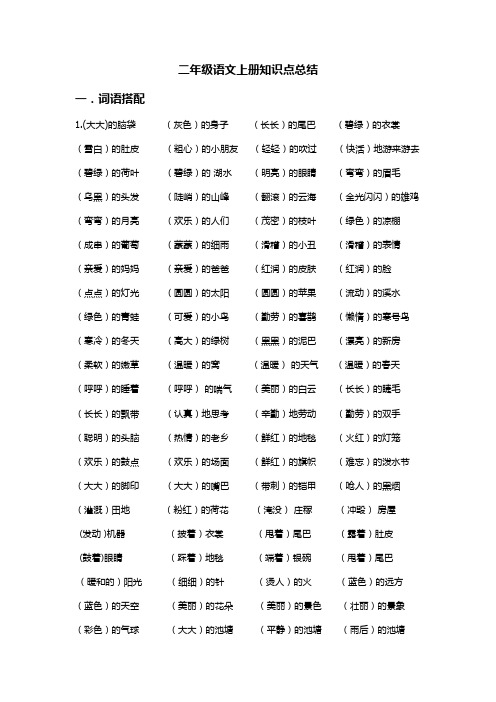
二年级语文上册知识点总结一.词语搭配1.(大大)的脑袋(灰色)的身子(长长)的尾巴(碧绿)的衣裳(雪白)的肚皮(粗心)的小朋友(轻轻)的吹过(快活)地游来游去(碧绿)的荷叶(碧绿)的湖水(明亮)的眼睛(弯弯)的眉毛(乌黑)的头发(陡峭)的山峰(翻滚)的云海(金光闪闪)的雄鸡(弯弯)的月亮(欢乐)的人们(茂密)的枝叶(绿色)的凉棚(成串)的葡萄(蒙蒙)的细雨(滑稽)的小丑(滑稽)的表情(亲爱)的妈妈(亲爱)的爸爸(红润)的皮肤(红润)的脸(点点)的灯光(圆圆)的太阳(圆圆)的苹果(流动)的溪水(绿色)的青蛙(可爱)的小鸟(勤劳)的喜鹊(懒惰)的寒号鸟(寒冷)的冬天(高大)的绿树(黑黑)的泥巴(漂亮)的新房(柔软)的嫩草(温暖)的窝(温暖)的天气(温暖)的春天(呼呼)的睡着(呼呼)的喘气(美丽)的白云(长长)的睫毛(长长)的飘带(认真)地思考(辛勤)地劳动(勤劳)的双手(聪明)的头脑(热情)的老乡(鲜红)的地毯(火红)的灯笼(欢乐)的鼓点(欢乐)的场面(鲜红)的旗帜(难忘)的泼水节(大大)的脚印(大大)的嘴巴(带刺)的铠甲(呛人)的黑烟(灌溉)田地(粉红)的荷花(淹没)庄稼(冲毁)房屋(发动 )机器(披着)衣裳(甩着)尾巴(露着)肚皮(鼓着)眼睛(踩着)地毯(端着)银碗(甩着)尾巴(暖和的)阳光(细细)的针(烫人)的火(蓝色)的远方(蓝色)的天空(美丽)的花朵(美丽)的景色(壮丽)的景象(彩色)的气球(大大)的池塘(平静)的池塘(雨后)的池塘二.量词搭配一(只)海鸥一(片)沙滩一(艘)军舰一(条)帆船一(方)鱼塘一(行)垂柳一(块)稻田一(片)花园一(座)石桥一(孔)石桥一(丛)翠竹一(群)飞鸟一(面)队旗一(把)铜号一(棵)葫芦一(片)枫叶一(张)贺卡一(首)小诗一(棵)小树一(把)尺子一(户)人家一(台)电脑一(张)白纸一(双)手套一(条)长龙一(堵)石崖一(片)欢笑一(道)小溪一(处)港湾一(只)蝴蝶一(个)孩子一( 处 )古迹一(座)奇峰一(支)圆珠笔一(只)青蛙一(方)砚台一(方)手帕一(阵)寒风一(朵)白云一(朵)浪花一(朵)鲜花一(颗)石子一(只)乌鸦一(场)大雨一(只)纸船一(张)纸条一(只)风筝一(把)斧头一(条)小溪一(条)鱼一(匹)马一(件)事一(杆)秤一(条)河一(只)鸟一(口)井一(封)信一(束)花一 (幅) 画一(棵)树一(头)象一(道)缝一(桶)水一(把)刀一(座)山三.ABB 式的词语喜洋洋笑盈盈兴冲冲乐呵呵笑哈哈金灿灿亮晶晶绿油油白茫茫黄艳艳红彤彤黄橙橙乐滋滋湿漉漉红通通红艳艳红扑扑黑乎乎白花花黑压压甜蜜蜜软绵绵懒洋洋气冲冲胖乎乎冷冰冰静悄悄笑咪咪四.含有数字的成语(或者是含有两个数字)一清二白一言不发三心二意三言两语四面八方五光十色七上八下一字千金一路平安一成不变一言为定一无所有一本正经一心一意一干二净一穷二白一望无际一五一十一扫而空、一目十行一见如故半斤八两二话不说两全其美两面三刀两败俱伤两手空空三言两语三番五次三长两短三思而行三更半夜三天两头三心二意四面八方四脚朝天四海为家四平八稳四通八达四分五裂四书五经五彩缤纷五颜六色五花八门五马分尸五湖四海六神无主六六大顺六亲不认七上八下七嘴八舌七零八落七窍生烟八面威风八面玲珑八拜之交九九归一九牛一毛九死一生十面埋伏十全十美十拿九稳十万火急十指连心百发百中百花齐放百依百顺百战百胜百里挑一百年树人千方百计千言万语千秋万代万水千山万事如意万事大吉千言万语千秋万代千变万化五.AABB来来往往的的确确真真假假许许多多千千万万整整齐齐方方面面形形色色漂漂亮亮白白胖胖老老少少明明白白清清白白风风雨雨快快乐乐高高兴兴开开心心欢欢喜喜长长久久团团圆圆普普通通辛辛苦苦马马虎虎认认真真清清楚楚轻轻松松纷纷扬扬平平安安大大方方安安静静山山水水风风火火六、ABCC:得意洋洋风尘仆仆怒气冲冲喜气洋洋想入非非心事重重两手空空白发苍苍硕果累累春雨绵绵大雪纷纷金光闪闪秋风习习七.象声词:风声(呼、萧萧)雷声(隆隆、轰隆)雨声(哗哗、淅沥)水声(、哗啦、哗啦哗啦、滴嗒)撞击声(叮当、噼啪)AABB:叮叮当当滴滴答答嘻嘻哈哈ABAB:丁零丁零呼哧呼哧咔嚓咔嚓呼噜呼噜淅沥淅沥嘀嗒嘀嗒吧嗒,扑通,哗啦咣当,咕咚咕嘟,叮咚吧唧(同步做过)冻得直打哆嗦热得直冒汗冷得像冰窖热得像蒸笼 (课本第63页) 八.描写四季特点的成语:春:春光明媚春回大地春暖花开春色满园和风细雨花红柳绿鸟语花香春暖花香含苞待放百花争艳夏:骄阳似火烈日当空烈日炎炎炎炎夏日挥汗如雨电闪雷鸣秋:秋高气爽硕果累累一叶知秋春华秋实秋风落叶秋雨绵绵冬:天寒地冻寒冬腊月滴水成冰冰天雪地鹅毛大雪冰封大地九.分类词语:1、无*无*:无边无际无声无息无法无天无穷无尽2、大*大*:大手大脚大是大非大吃大喝大红大绿大风大浪大吵大闹3、一*一*:一举一动一言一行一生一世一草一木一点一滴一年一度一五一十一心一意4、又*又*又高又胖又细又长又蹦又跳又酸又甜又哭又笑又好又快又渴又累十.含有颜色的词语(或者含有两种颜色)五颜六色万紫千红花红柳绿黑白分明青黄不接红红火火红男绿女花花绿绿大红大紫青山绿水白里透红唇红齿白红白相间十一含有动物的词语(或者含有两种动物)狼吞虎咽龙飞凤舞鸡鸣狗盗惊弓之鸟漏网之鱼害群之马胆小如鼠如虎添翼如鱼得水羊入虎口猴年马月画龙点睛生龙活虎狼心狗肺(语文课本第11页)十二.日积月累梅花小儿垂钓江雪宋王安石唐胡令能唐柳宗元墙角数枝梅,蓬头稚子学垂纶,千山鸟飞绝,凌寒独自开。
部编人教版六年级上册语文 期末复习专项知识点梳理3 词语

第
六
单
元
1.同茫茫宇宙相比,地球是渺小的。(这句话使用了作比较的说明方法,说明人类的活动范围是非常有限的,也说明了地球对于人类非常珍贵,人类应该保护地球。)
2.她忐忑不安地想:“他会说什么呢?这是闹着玩的吗?自己的五个孩子已经够他受的了……是他来啦?……不,还没来!……为什么把他们抱过来啊?……他会揍我的!那也活该,我自作自受……嗯,揍我一顿也好!”(这段话是对桑娜的心理描写,省略号的连续运用,表明桑娜当时的心理活动时断时续,逼真地写出了桑娜的不安。透过桑娜的心理活动,我们能充分感受到生活给桑娜带来的压力,感受到桑娜宁愿自己受苦也要帮助他人的高尚的心灵。)
2.这位普通老人让我领悟到:青山是不会老的。(“青山”指的是苍翠浓郁、绿意荡漾的高山。“不老”指的是不会衰老。这里运用了拟人的修辞手法,表面上是说青翠的高山永远不会衰老,实际上是暗示着某种精神与世永存。老人不仅留下了青山,还留下了与环境做斗争的不屈精神和绿化环境、保护家园的奉献精神。老人的精神不老,青山也必将长青。)
巧夺天工惟妙惟肖画龙点睛笔走龙蛇妙笔生花栩栩如生
第
八
单
元
形容认真的词语:
全神贯注目不转睛聚精会神郑重其事专心致志一丝不苟
形容不认真的词语:
囫囵吞枣粗枝大叶不求甚解走马观花敷衍了事三心二意
二、近义词。
第一单元
凝视——凝望单薄——薄弱分辨——辨别朦胧——模糊
第二单元
屹立——耸立斩钉截铁——毅然决然全神贯注——聚精会神
答案示例:我拿出试卷,望着那红红的72分,忐忑不安地想:这可怎么向妈妈交代呀?我可是向妈妈打了包票的呀!妈妈会批评我吗?我真不应该考试前耍小聪明。
2024年二年级语文必会必背知识点汇总人教版可用可打印

人教版二年级语文必会必背知识点汇总(生字、词语、课文、古诗词)一、生字(一)会认的生字(部分列举)1. 《小蝌蚪找妈妈》-塘(táng)、脑(nǎo)、袋(dài)、灰(huī)、哇(wa)、教(jiāo)、捕(bǔ)、迎(yíng)、阿(ā)、姨(yí)2. 《我是什么》-晒(shài)、极(jí)、傍(bàng)、越(yuè)、滴(dī)、溪(xī)、奔(bēn)、洋(yáng)、坏(huài)、淹(yān)、没(mò)、冲(chōng)、毁(huǐ)、屋(wū)、猜(cāi)3. 《植物妈妈有办法》-植(zhí)、如(rú)、为(wéi)、旅(lǚ)、备(bèi)、纷(fēn)、刺(cì)、底(dǐ)、炸(zhà)、离(lí)、察(chá)、识(shí)(二)会写的生字(部分列举)1. 《小蝌蚪找妈妈》-两(liǎng)、哪(nǎ)、宽(kuān)、顶(dǐng)、眼(yǎn)、睛(jīng)、肚(dù)、皮(pí)、孩(hái)、跳(tiào)2. 《我是什么》-变(biàn)、极(jí)、片(piàn)、傍(bàng)、海(hǎi)、洋(yáng)、作(zuò)、给(gěi)、带(dài)3. 《植物妈妈有办法》-法(fǎ)、如(rú)、脚(jiǎo)、它(tā)、娃(wá)、她(tā)、毛(máo)、更(gèng)、知(zhī)、识(shí)二、词语(一)词语搭配1. 形容词搭配-(大大)的脑袋、(黑灰色)的身子、(长长)的尾巴、(碧绿)的衣裳、(雪白)的肚皮、(快活)地游来游去-(温和)的眼睛、(灌溉)田地、(淹没)庄稼、(冲毁)房屋、(发动)机器、(破坏)河堤-(粗心)的小朋友、(满意)的笑容、(明亮)的眼睛、(弯弯)的眉毛、(红润)的脸蛋、(乌黑)的头发2. 动词搭配-(甩)着尾巴、(披)着衣裳、(露)着肚皮、(跳)着舞、(唱)着歌、(捉)害虫、(想)办法、(迎)上去、(追)上去、(游)过去(二)词语积累1. AABB 式词语-许许多多、开开心心、平平安安、快快乐乐、明明白白、红红火火、大大小小、多多少少2. ABAB 式词语-雪白雪白、火红火红、金黄金黄、碧绿碧绿、乌黑乌黑、打扫打扫、整理整理、研究研究3. ABAC 式词语-游来游去、飞来飞去、走来走去、跑来跑去、跳来跳去、荡来荡去、又大又红、又高又大、又细又长、又白又胖4. 含有数字的词语-一心一意、二话不说、三心二意、四面楚歌、五颜六色、六神无主、七上八下、八面玲珑、九牛一毛、十全十美三、课文1. 《小蝌蚪找妈妈》-了解小蝌蚪变成青蛙的过程:小蝌蚪先长出两条后腿,再长出两条前腿,然后尾巴变短,最后尾巴消失,变成了青蛙。
小学二年级语文知识点(词语 句子 超全面)

小学二年级语文知识点(词语句子超全面)小学二年级语文知识点(词语句子超全面)1.宜实色华谷金尽层丰壮2.波浪灯作字苹丽劳3.尤其区巨它安块站4.已甲豆识纷经如好娃洼5.于首枝枫记刘6.胡戏棋钢观弹琴养7.休伸甜歌院除息您牵困8.员青宁室样校切教响班9.欠元包钟叹哈迟闹10.及身仔细次外计怦礼加11.夕与川州台争民族12.亿洁欢祖旗帜庆曲13.央交市旁优阴坛城国图14.申匹互京泪洋拥抱相扬15.讲打指接惊故候奇16.寸落补拔功助取所17.信沿抬际蛙错答还18.言每治棵挂哇怪慢19.怎思穿弯比服浅漂啦啊20.夫表示号汗伤吸极21.串兔告诉狐狸猴颗·词语适宜果实华丽谷物金色尽量云层丰收形状波浪灯光工作文字苹果美丽劳动尤其其实地区巨大它们安全石块站立已经铠甲大豆认识纷飞经过如果好像娃娃水洼于是首领枝头枫叶记住姓刘二胡游戏跳棋钢铁钢琴观看弹琴钢琴修养休息伸手甜美歌声院子消除信息您好牵挂困难学员青春安宁教室样子学校亲切教室响亮班级欠条元旦包子闹钟叹气哈欠迟到吵闹及时身体仔细名次外面计时怦怦跳礼物加法夕阳参与山川广州讲台争吵民族亿万洁白欢快祖国旗帜庆祝乐曲中央交通市民旁边优秀阴天花坛城市国家图案申请匹夫互相北京泪水海洋拥抱相似飞扬讲课打架指路接着惊奇故事时候奇怪尺寸落叶补充拔出成功助手取出所以相信井沿抬高边际青蛙回答还书言语每天治病一棵挂住好哇怪物慢跑怎么心思穿上弯曲比较衣服浅色漂亮好啦好啊大夫表示号角汗水伤心吸收极其一串兔子告诉狐狸猴子一颗22.斤折挑根独满容易23.采背板椅但傍清消24.由术吐注课铅笔桌景拿25.坏松扎抓祝福句幸26.之令布直当第现期轮路27.丑永饥饱温暖贫富28.户亚角周床病始张29.寻良食双体操场30.份粉昨晴姑娘妹读31.舟乘音客何汪32.丛牢拍护保物鸡猫33.羽领捉理跃蹦灵晨34.失觉扔掉眼睛纸船35.久乎至死腰捡粒被36.并夜喜重味轻刻群37.卫运宇宙航舰38.冲晒池浮灾害黑器39.岸纹洞影倒游圆围40.杯件住须能飘必事41.历史灭克化代孙植42.厂产介农科技纺织千斤折断挑起树根独自满意容易采药背包木板椅子但是傍晚清水消失由于美术吞吐注意课本铅笔桌子景色拿着坏话松树扎风筝抓住祝福句子幸福总之命令宣布直尺当时第一现在期间轮子走路小丑永远饥饿饱饭温暖贫穷富有窗户亚洲角落周围床边生病开始张望寻找优良食物双手体育操场双份面粉昨天晴天姑娘妹妹读书轻舟乘船音乐客人如何汪洋丛林牢固拍打保护动物小鸡猫咪羽毛领子捉住理由跳跃蹦跶灵动清晨失去感觉扔掉眼睛纸船永久在乎至于生死弯腰捡起米粒被子并且夜里喜欢重要味道年轻刻苦羊群卫星运动宇宙航海舰队冲动晒干水池漂浮灾害黑暗机器岸边纹理洞口影子倒映游戏圆圈围巾杯子文件住处必须能力漂浮必要事情历史灭绝克服化石古代儿孙植树工厂生产介意农业科技纺织小学二年级语文知识点(词语句子超全面)做()作()坐()座()丽()力()粒()立()利()历()旗()其()奇()骑()棋()齐()员()元()园()原()圆()住()注()祝()助()惊()精()经()京()睛()课()克()刻()客()教()交()郊()科()棵()颗()后()候()场()厂()是()事()市()室()视()世()示()适()似()时()石()食()识()实()拾()平()评()苹()坪()由()游()犹()尤()油()户()互()护()为()喂()位()味()未()卫()值()植()直()清()青()轻()洗()喜()忆()易()意()亿()被()背()贝()细()戏()只()纸()指()美()每()史()始()使()记()寄()纪()技()计()继()季()际()成()城()乘()诚()迟()池()带()代()级()及()急()极()集()飘()漂()金()斤()今()巾()状()壮()风()疯()丰()枫()古()谷()劳()牢()快()块()筷()以()已()椅()分()纷()于()鱼()余()愉()手()首()守()求()球()只()之()知()支()织()汁()枝()龙()笼()刚()钢()胡()湖()狐()葫()关()观()官()琴()勤()弹()谈()坛()修()休()申()伸()身()深()中()钟()终()子()仔()里()理()礼()李()访()纺()良()梁()粮()粱()湾()弯()穿()川()周()州()洲()舟()组()祖()至()治()帜()洁()节()杰()结()乡()相()香()抬()台()杨()扬()洋()扬()汗()汉()工()公()功()彩()采()桌()捉()不()部()布()步()脚()角()份()奋()从()丛()灵()零()见()健()舰()到()倒()文()纹()背()杯()悲()呗()需()须()始()史()·词语1.景色宜人春华秋实五谷丰登金秋时节层林尽染山河壮美2.尤其巨石风景区它们安徽几块站在闻名中外奇形怪状3.已经铠甲豌豆知识纷纷如果娃娃山洼好办法4.两首枫林须记5.二胡京戏象棋鸽子弹钢琴观天气养金鱼电脑6.休息伸进唱歌小院消除疲倦挂牵感谢您又香又甜7.委员教室一样学校亲切响起开班会8.书包叹气迟到闹钟一分钟打哈欠9.普及身边仔细格外怦怦队礼更加计算机各种各样10.山川神州民族华夏大陆争朝夕台湾岛11.火红洁白欢庆祖国旗帜乐曲果实美好田野蓝天12.中央城市两旁城市优美花坛图案名胜古迹川流不息立交桥绿树成阴13.申奥互相泪水海洋拥抱飘扬奥林匹克成功不约而同14.讲起接着惊奇故乡时候雪景指了指橱窗堆雪人打雪仗15.尺有所短寸有所长取长补短徒劳无功瓜熟蒂落拔苗助长16.不信井沿抬头青蛙弄错回答还用无边无际坐井观天17.葫芦蚜虫邻居奇怪每天一棵慢慢地自言自语18.怎么穿上意思衣服漂亮浅绿色又细又长弯弯曲曲又大又红19.纤夫表示流汗号子伤心极了吸气无影无踪断断续续摇摇摆摆20.告诉狐狸猴子兔子一颗葡萄架一串串转来转去迫不及待21.一根泰山计谋火焰搓绳挑千斤容易折春满园一花独放百花齐放22.板凳认真但是清晨背着椅子消除傍晚刺猬采果子粗糙留下23.铅笔风景注意拿起桌子盒子美术课不由得吞吞吐吐惹人爱皱着眉头24.松鼠小熊抓住纸船草莓漂流一句话扎风筝祝你幸福25.宣布轮流下令星期现在上任习惯方式郑重笑眯眯走路第一个直摇头叫苦连天议论纷纷万兽之王26.饥寒温饱冷暖贫富爱恨冷漠热忱永远索取奉献雪中送炭27.科利亚窗户病床一角天空开始四周一张脸叽叽喳喳摇摇摆摆指手画脚28.寻食马良哭泣操场身体假如神笔遥远一双健康29.一份昨天姑娘妹妹读书日记羡慕布料白纱裙粉红色迫不及待30.乘舟乡音何处相识欲行桃花潭踏歌声31.拍手丛林保护锦鸡牢记动物熊猫孔雀黄鹂百灵嬉戏32.羽毛活跃捕捉机灵梳理鸟巢蓬松清晨红领巾蹦蹦跳跳叽叽喳喳33.消失觉得眼睛波纹欣赏山峦掉进游船扔向面包纸展翅欲飞34.多久捡起在乎干死弯腰沙粒甚至继续叨念散步35.并没有喜欢气味时刻过夜很轻一群热腾腾雾蒙蒙36.人造卫星宇宙飞船航空母舰运载火箭后羿射日女娲补天精卫填海嫦娥奔月37.晒黑池子冲毁灾害机器漂浮暴躁灌溉淹没38.桥洞岸上倒影波纹周围游回回声半圆39.杯子钩住漂浮必须可能一件事舒服太空设计有趣40.化石历史灭绝千克植物熟悉缺乏博物馆公孙树一代一代41.介绍科技农业产量织布棉纺厂兴致勃勃引人注目·近义词于反义词反义词: 动—静冷—热老—少买—卖有—无爱—恨来—去宽—窄里—外新—旧笑—哭高—低问—答苦—甜进—退长—短明—暗升—降头—尾先—后轻—重南—北出—进忙—闲好—坏对—错远—近弯—直多—少细—粗胖—瘦真—假早—晚软—硬古—今反—正活—死高—矮出—入熟—生美—丑借—还快—慢饿—饱勤劳—懒惰浪费—节约难看—漂亮难过—高兴喜欢—讨厌温暖—寒冷敌人—朋友高兴—生气粗心—细心成功—失败进步—落后认真—马虎安全—危险复杂—简单近义词:高兴—快乐朋友—伙伴小心—仔细好玩—有趣着急—焦急美丽—漂亮中心—中央著名—有名特别—非常景色—风景壮美—壮丽勤劳—勤快好像—仿佛尤其—特别疲倦—疲劳安静—宁静消除—去除关心—关怀闻名中外——举世闻名奇形怪状——千奇百怪热爱—喜爱突然—忽然AAB的词型:大大的胖胖的美美的黑黑的热热的甜甜的香香的蓝蓝的绿绿的红红的ABB的叠词:圆溜溜笑眯眯笑嘻嘻静悄悄绿油油黄澄澄白花花红艳艳黑乎乎亮晶晶水灵灵兴冲冲喜洋洋喜滋滋美滋滋笑哈哈冷冰冰胖乎乎红润润懒洋洋慢吞吞光秃秃AABB的叠词:严严实实来来往往舒舒服服明明白白开开心心红红火火许许多多清清楚楚团团圆圆来来往往干干净净说说笑笑花花绿绿快快乐乐高高兴兴进进出出打打闹闹吞吞吐吐干干净净认认真真ABAB的叠词:讨论讨论研究研究商量商量打扫打扫鲜红鲜红放松放松雪白雪白暖和暖和碧绿碧绿蔚蓝蔚蓝金黄金黄洁白洁白通红通红火红火红浅红浅红翠绿翠绿ABAC的叠词:又说又笑又大又红又香又甜又松又软又唱又跳又哭又闹又大又圆又黑又小又高又大又细又长又白又胖又黑又瘦又黑又亮又粗又壮又矮又胖又香又脆游来游去飞来飞去走来走去跑来跑去跳来跳去说来说去写来写去想来想去其他词语: 神气极了可怕极了漂亮极了伤心极了开心极了可爱极了害怕极了认真极了立刻喊起来立刻欢呼起来立刻唱起来立刻跳起来立刻叫起来立刻跑起来踮起脚尖消除疲劳热爱劳动关心集体堆雪人打雪杖看雪景·多音字都dōu(都有)当dāng(应当)为wéi(四海为家)都dū(首都)当dàng(当作)为wèi(因为)弹tán(弹琴)省shěng(省份)铺pū(铺床)觉jiào(睡觉)弹dàn(子弹)省xǐng(自省)铺pù(铺子)觉jué(自觉)曲qǔ(曲子)传chúan(传说)厦shà(大厦)卷juǎn(卷尺)曲qū(弯曲)传zhùan(传记)厦xià(厦门)卷juàn(卷子)似sì(似乎)模mú(模样)教jīāo(教书)朝cháo(朝代)似shì(似的)模mó(航模)教jìào(教室)朝zhāo(朝阳)宁níng(安宁)背bēi(背带)兴xīng(兴奋)扇shān(扇风)宁nìng(宁愿)背bèi(背诵)兴xìng(高兴)扇shàn(扇子)还hái(还有)转zhuàn(转动)折zhé(折断)号háo(号叫)还huán(还给)转zhuǎn(转身)折shé(折腰)号hào(口号)吐tù(吐血)扎zā(扎风筝)削xiāo(削铅笔)乘chéng(乘法)吐tǔ(吐出)扎zhā(扎手)削xuē(剥削)乘shèng(千乘之国)当dāng(当然)藏cáng(捉迷藏)好hào(好学)重zhòng(重要)当dàng(当铺)藏zàng(藏族)好hǎo(好事)重chóng(重复)中zhōng(中国)冲chòng(冲着)奔bēn(奔跑)少shào(少年)中zhòng(中把)冲chōng(冲走)奔bèn(投奔)少shǎo(很少)没méi(没有)倒dǎo(倒下)分fēn(区分)角jiǎo(角落)没mò(出没)倒dào(倒退)分fèn(养分)角jué(角色)蒙mēng(蒙了)着zháo(着急)切qiē(切菜)蒙méng(蒙蒙细雨)着zhe (看着)切qiè(亲切)蒙měng(内蒙古)着zhuó(沉着)盛shèng(盛开)降jiàng(降落伞)笼lóng(笼子)长cháng(长短)盛chéng(盛饭)降xiáng(投降)笼lǒng(笼罩)长zhǎng(长大)看kān(看护)待dāi(待会)挑tiāo(挑水)漂piāo(漂流)看kàn(看见)待dài(等待)挑tiǎo(挑拨)漂piào(漂亮)假jiǎ(虚假)将jiāng(将军)空kōng(天空)乐lè(快乐)假jià(假日)将jiàng(大将)空kòng(空地)乐yuè(乐曲)·句子练习小学二年级语文知识点(词语句子超全面)例、叶子上的虫子还用治?叶子上的虫子不用治。
(完整版)高考语文必看重点知识点
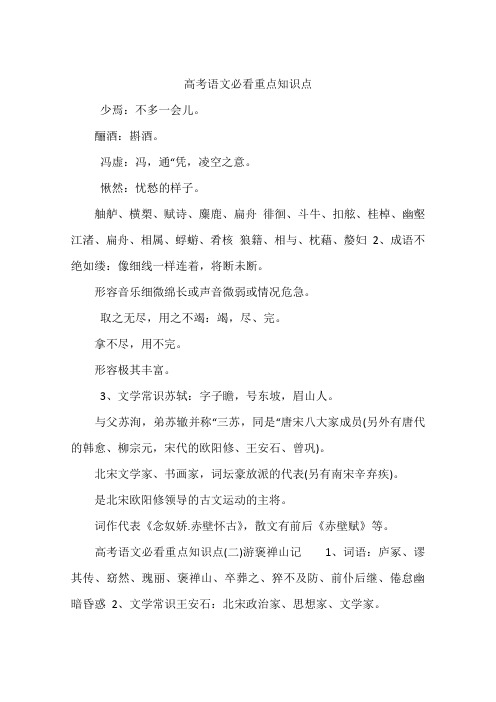
高考语文必看重点知识点少焉:不多一会儿。
酾酒:斟酒。
冯虚:冯,通“凭,凌空之意。
愀然:忧愁的样子。
舳舻、横槊、赋诗、麋鹿、扁舟徘徊、斗牛、扣舷、桂棹、幽壑江渚、扁舟、相属、蜉蝣、肴核狼籍、相与、枕藉、嫠妇2、成语不绝如缕:像细线一样连着,将断未断。
形容音乐细微绵长或声音微弱或情况危急。
取之无尽,用之不竭:竭,尽、完。
拿不尽,用不完。
形容极其丰富。
3、文学常识苏轼:字子瞻,号东坡,眉山人。
与父苏洵,弟苏辙并称“三苏,同是“唐宋八大家成员(另外有唐代的韩愈、柳宗元,宋代的欧阳修、王安石、曾巩)。
北宋文学家、书画家,词坛豪放派的代表(另有南宋辛弃疾)。
是北宋欧阳修领导的古文运动的主将。
词作代表《念奴娇.赤壁怀古》,散文有前后《赤壁赋》等。
高考语文必看重点知识点(二)游褒禅山记1、词语:庐冢、谬其传、窈然、瑰丽、褒禅山、卒葬之、猝不及防、前仆后继、倦怠幽暗昏惑2、文学常识王安石:北宋政治家、思想家、文学家。
字介甫,晚号半山。
世称王荆公,卒谥文。
临川人。
两次任宰相,依靠神宗实行变法,被列宁誉为“中国十一世纪的改革家。
主张文章应“有补于世。
著作收在《临川先生文集》里。
就任北京大学校长之演说[刮目相见]比喻另眼看待。
、[时阅数载]时间经过几年。
阅,经过。
[长足]形容进展迅速。
、[长(zhǎng)斯校]当此校校长。
[提携(xié)]比喻在事业上扶植后辈。
[姑不具论]暂且不作论述。
具,陈述、[宗旨既乖]宗旨既然错误。
乖,错误。
[敷衍]这儿指学习不认真。
[砥砺(lì)]磨练。
[裨(bì)]有益。
[营营]形容辛苦劳累。
[切磋(cuō)]指共同学习互相研究讨论。
[视事]到职开始工作。
[潜修]深入钻研。
[商榷(què)]商讨。
[店肆(sì)]店铺。
[责无旁贷]自己应尽的责任,不能推卸给别人。
贷,推卸。
[开诚布公]指以诚待人,坦白无私。
开诚,敞开胸怀,显示诚意。
[规行矩步]比喻举动合乎规矩,毫无苟且。
四年级上册单元知识点盘点(词句段运用)
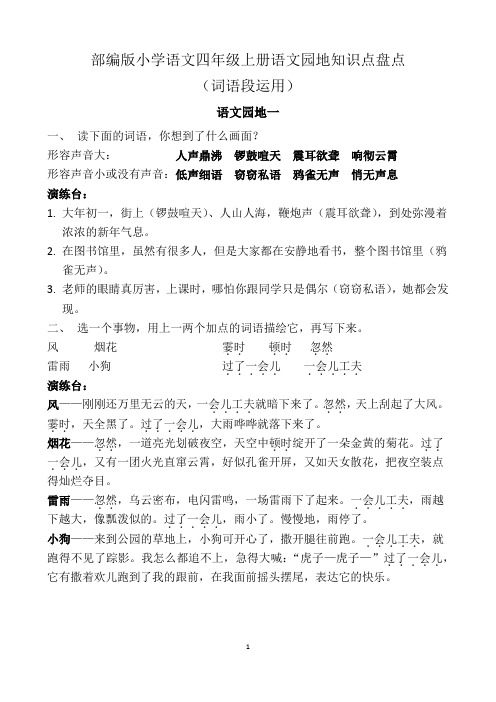
部编版小学语文四年级上册语文园地知识点盘点(词语段运用)语文园地一一、读下面的词语,你想到了什么画面?形容声音大:人声鼎沸锣鼓喧天震耳欲聋响彻云霄形容声音小或没有声音:低声细语窃窃私语鸦雀无声悄无声息演练台:1.大年初一,街上(锣鼓喧天)、人山人海,鞭炮声(震耳欲聋),到处弥漫着浓浓的新年气息。
2.在图书馆里,虽然有很多人,但是大家都在安静地看书,整个图书馆里(鸦雀无声)。
3.老师的眼睛真厉害,上课时,哪怕你跟同学只是偶尔(窃窃私语),她都会发现。
二、选一个事物,用上一两个加点的词语描绘它,再写下来。
风烟花霎时....忽然..顿时雷雨小狗过了一会儿..........一会儿工夫演练台:风——刚刚还万里无云的天,一会儿工夫....就暗下来了。
忽然..,天上刮起了大风。
霎时.....,大雨哗哗就落下来了。
..,天全黑了。
过了一会儿烟花——忽然....,一道亮光划破夜空,天空中顿时..绽开了一朵金黄的菊花。
过了一会儿...,又有一团火光直窜云霄,好似孔雀开屏,又如天女散花,把夜空装点得灿烂夺目。
雷雨——忽然.....,雨越..,乌云密布,电闪雷鸣,一场雷雨下了起来。
一会儿工夫下越大,像瓢泼似的。
过了一会儿.....,雨小了。
慢慢地,雨停了。
小狗——来到公园的草地上,小狗可开心了,撒开腿往前跑。
一会儿工夫.....,就跑得不见了踪影。
我怎么都追不上,急得大喊:“虎子—虎子—”过了一会儿.....,它有撒着欢儿跑到了我的跟前,在我面前摇头摆尾,表达它的快乐。
部编版小学语文四年级上册语文园地知识点盘点(词语段运用)语文园地二一、读一读,体会每组句子在表达上的不同。
◇那时没有电灯,没有电视,没有收音机,也没有汽车。
◇那时没有电灯、电视、收音机和汽车。
第一句反复运用“没有”更能突显那时候物资匮乏,经济十分落后。
◇那条狗高兴的时候叫,紧张的时候叫,发怒的时候也叫。
◇那条狗高兴、紧张、发怒的时候都叫。
第一句反复使用“叫”更能突显那条狗十分爱叫的特点。
人教版四年级语文上册知识点归纳(字、词、句、学有所悟)

人教版四年级语文上册知识点归纳〔分字、词、句、学有所悟四个局部〕一、字〔一〕400个生字,见课文第180~185页。
〔二〕多音字扒:bā〔扒开〕pá〔扒手〕把:bǎ〔把握〕bà〔刀把〕背:bēi〔背负〕bèi〔背诵〕奔:bēn〔奔波〕bèn〔投奔〕辟:pì〔开辟〕bì〔辟邪〕薄:báo〔薄饼〕bó〔薄弱〕bò〔薄荷〕差:chā〔差距〕chà〔差点儿〕差:chāi〔派遣〕cī〔参差不齐〕称:chèn〔满意〕chēng〔简称〕chèng〔同秤〕乘:shènɡ〔千乘之国〕chénɡ〔乘法〕冲:chōng〔冲动〕chòng〔冲劲儿〕得:de〔得到〕děi〔你得用功〕的:de〔我的〕dí〔确实〕dì〔目的〕地:de〔慢慢地走〕dì〔地球〕调:tiáo〔调整〕diào〔调查〕度:dù〔度假〕duó〔揣度〕恶:ě〔恶心〕è〔凶恶〕wù〔可恶〕缝:féng〔补缀〕fèng〔缝隙〕给:gěi〔送给〕jǐ〔供给〕供:gōng〔供给〕gòng〔口供〕冠:ɡuàn〔冠军〕ɡuān〔鸡冠花〕好:hǎo〔好事〕hào〔爱好〕号:háo〔号叫〕hào〔口令〕喝:hē〔喝水〕hè〔喝彩〕和:hé〔和平〕huò〔和药〕huó〔和面〕华:huá〔华美〕huà〔华山〕还:huán〔归还〕hái〔还有〕间:jiān〔人间〕jiàn〔间接〕将:jiānɡ〔将来〕jiànɡ〔将士〕降:jiànɡ〔下降〕xiánɡ〔投降〕教:jiāo〔教书〕jiào〔教师〕结:jiē〔结实〕jié〔结束〕解:jiě〔解释〕jiè〔解元〕xiè〔解气〕禁:jīn〔情不自禁〕jìn〔禁止〕卷:juàn〔试卷〕juǎn〔花卷〕看:kàn〔观看〕kān〔看守〕吭:háng〔引吭高歌〕kēng〔吭气〕空:kònɡ〔空闲〕kōnɡ〔空气〕笼:lǒng〔笼罩〕lóng〔笼子〕率:shuài〔率领〕lǜ〔效率〕脉:mài〔脉搏〕mò〔脉脉含情〕没:méi〔没有〕mò〔神出鬼没〕闷:mēn〔闷热〕mèn〔闷雷滚动〕蒙:mēng〔蒙骗〕méng〔启蒙〕měng〔蒙古〕秘:mì〔秘书〕bì〔秘鲁〕模:mó〔模范〕mú〔模样〕难:nán〔困难〕nàn〔灾难〕屏:pínɡ〔屏幕〕bǐnɡ〔屏息凝视〕铺:pū〔铺床〕pù〔铺面〕强:qiánɡ〔强大〕jiànɡ〔倔强〕qiǎnɡ〔勉强〕曲:qū〔弯曲〕qǔ〔歌曲〕圈:quān〔圈子〕juàn〔猪圈〕舍:shě〔舍弃〕shè〔宿舍〕数:shǔ〔数落〕shù〔数学〕似:shì〔似的〕sì〔相似〕为:wéi〔为人处事〕wèi〔为什么〕相:xiāng〔相当〕xiàng〔照相〕兴:xīnɡ〔兴奋〕xìnɡ〔快乐〕行:háng〔银行〕xíng〔步行〕应:yīnɡ〕应该〔yìnɡ〕容许载:zǎi〔记载〕zài〔载重〕择:zē〔选择〕zhái〔择菜〕占:zhān〔占卜bǔ;萝卜bo〕zhàn〔占据〕涨:zhǎng〔溪水猛涨〕zhàng〔头昏脑涨〕折:shé〔折本〕zhē〔折腾〕zhé〔折磨〕挣:zhēng〔挣扎〕zhèng〔挣钱〕重:chónɡ〔重复〕zhònɡ〔重心〕属:shǔ〔金属〕zhǔ〔属望〕转:zhuàn〔转圈〕zhuǎn〔转弯〕着:zháo〔着凉〕zhuó〔穿着〕zhe〔等着〕钻:zuān〔钻研〕zuàn〔钻石〕二、词〔一〕四字词语昂首东望蹦蹦跳跳变化多端不可思议不容置疑不胜其烦草翠花开趁其不备程控电话尺有所短崇山峻岭出乎意料沉着不迫寸有所长得意扬扬灯红酒绿帝国主义电话号码风和日丽风平浪静供养不周骨肉同胞归根到底毫不可惜毫不相让号啕大哭浩如烟海和睦相处横贯江面呼风唤雨患难与共恍恍惚惚恍然大悟架子十足金碧辉煌筋疲力尽精神大振久经沙场局促不安举世无双涓涓细流可怜巴巴铿锵有力空空如也枯枝败叶狂风大作理所当然帘帘飞瀑绿树成阴慢条斯理漫天卷地美味佳肴南征北战年少气盛年逾古稀农耕社会平安无事屏息凝视齐头并进气魄雄伟千姿百态勤勤恳恳清波荡漾热闹非凡人迹罕至人声鼎沸人影绰绰如怨如诉假设隐假设现假设有所思山崩地裂山洪爆发身材魁梧神来之笔神秘莫测神清气爽神态自假设生气勃勃受益非浅殊死拼搏水天相接随遇而安所向披靡谈何容易滔滔江水腾云驾雾突如其来枉费心机鲜果飘香鲜花盛开享誉世界消磨时光协调有序欣喜假设狂形单影只形态各异雪花飞舞血脉亲情扬长而去耀武扬威一日三餐引吭大叫引人注意隐隐约约应接不暇用武之地郁郁苍苍远洋船舶跃跃欲试振兴中华枝折花落姿态不一自由自在坐卧不安〔二〕词型ABB:兴冲冲毛茸茸笑嘻嘻火辣辣金灿灿笑盈盈AABB:恍恍惚惚郁郁苍苍蹦蹦跳跳勤勤恳恳隐隐约约原原本本形形色色口口声声ABCC:可怜巴巴生气勃勃得意扬扬空空如也人影绰绰清波漾漾千里迢迢ABAC:自由自在如怨如诉无忧无虑无边无际无影无踪不闻不问AABC:涓涓细流帘帘飞瀑跃跃欲试滔滔江水空空如也〔三〕语搭配〔的、地、得〕〔皑皑〕的雪山〔奔腾〕的江水〔标准〕的答案〔长长〕的堤岸〔刺骨〕的寒风〔葱郁〕的树丛〔繁华〕的城市〔沸腾〕的温泉〔高大〕的城楼〔乖僻〕的性格〔关注〕的热点〔欢乐〕的笑声〔金碧辉煌〕的宫殿〔敬爱〕的老师〔漫长〕的严冬〔美好〕的情感〔美丽〕的公园〔美丽〕的画面〔暖和〕的地方〔亲爱〕的同学〔轻快〕的音乐〔轻微〕的响动〔热烈〕的掌声〔热闹〕的市场〔热切〕的愿望〔热情〕的接待〔希望〕的火种〔严重〕的疾病〔有名〕的长廊〔壮丽〕的景观〔尊敬〕的领导浩瀚的〔太空〕旅行的〔快乐〕神奇的〔用途〕特殊的〔乘客〕优良的〔品种〕有趣的〔旅行〕〔四〕成语归类1、打比方的成语:细雨如丝骨瘦如柴骄阳似火月光如水2、描写四季特点:春:春意盎然春暖花开满园春色春华秋实春风化雨夏:骄阳似火暑气蒸人烈日炎炎秋:秋风送爽秋高气爽秋色宜人冬:冰天雪地寒气袭人寒冬腊月3、十二生肖成语:鼠目寸光牛刀小试虎踞龙盘兔死狗烹龙飞凤舞杯弓蛇影马不停蹄羊肠小道杀鸡敬猴鸡犬不宁狗急跳墙猪朋狗友4、数字成语:一言九鼎二三其德三思而行四平八稳五谷丰收六神无主七步成诗八面玲珑九死一生十万火急百折不挠千山万水万死不辞零零碎碎三、句〔一〕名言警句1、珍惜时间合理安排时间,就等于节约时间。
人教版初中语文知识点之词语的语用特性总汇
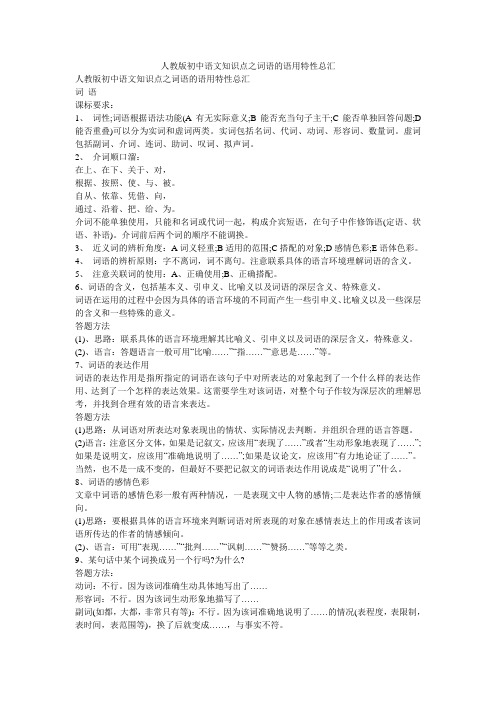
人教版初中语文知识点之词语的语用特性总汇人教版初中语文知识点之词语的语用特性总汇词语课标要求:1、词性;词语根据语法功能(A有无实际意义;B能否充当句子主干;C能否单独回答问题;D 能否重叠)可以分为实词和虚词两类。
实词包括名词、代词、动词、形容词、数量词。
虚词包括副词、介词、连词、助词、叹词、拟声词。
2、介词顺口溜:在上、在下、关于、对,根据、按照、使、与、被。
自从、依靠、凭借、向,通过、沿着、把、给、为。
介词不能单独使用,只能和名词或代词一起,构成介宾短语,在句子中作修饰语(定语、状语、补语)。
介词前后两个词的顺序不能调换。
3、近义词的辨析角度:A词义轻重;B适用的范围;C搭配的对象;D感情色彩;E语体色彩。
4、词语的辨析原则:字不离词,词不离句。
注意联系具体的语言环境理解词语的含义。
5、注意关联词的使用:A、正确使用;B、正确搭配。
6、词语的含义,包括基本义、引申义、比喻义以及词语的深层含义、特殊意义。
词语在运用的过程中会因为具体的语言环境的不同而产生一些引申义、比喻义以及一些深层的含义和一些特殊的意义。
答题方法(1)、思路:联系具体的语言环境理解其比喻义、引申义以及词语的深层含义,特殊意义。
(2)、语言:答题语言一般可用“比喻……”“指……”“意思是……”等。
7、词语的表达作用词语的表达作用是指所指定的词语在该句子中对所表达的对象起到了一个什么样的表达作用、达到了一个怎样的表达效果。
这需要学生对该词语,对整个句子作较为深层次的理解思考,并找到合理有效的语言来表达。
答题方法(1)思路:从词语对所表达对象表现出的情状、实际情况去判断。
并组织合理的语言答题。
(2)语言:注意区分文体,如果是记叙文,应该用“表现了……”或者“生动形象地表现了……”;如果是说明文,应该用“准确地说明了……”;如果是议论文,应该用“有力地论证了……”。
当然,也不是一成不变的,但最好不要把记叙文的词语表达作用说成是“说明了”什么。
四年级上册语文园地知识点
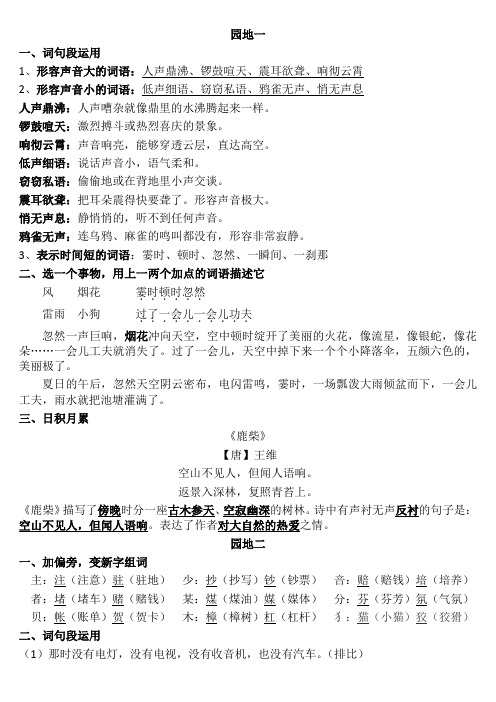
园地一一、词句段运用1、形容声音大的词语:人声鼎沸、锣鼓喧天、震耳欲聋、响彻云霄2、形容声音小的词语:低声细语、窃窃私语、鸦雀无声、悄无声息人声鼎沸:人声嘈杂就像鼎里的水沸腾起来一样。
锣鼓喧天:激烈搏斗或热烈喜庆的景象。
响彻云霄:声音响亮,能够穿透云层,直达高空。
低声细语:说话声音小,语气柔和。
窃窃私语:偷偷地或在背地里小声交谈。
震耳欲聋:把耳朵震得快要聋了。
形容声音极大。
悄无声息:静悄悄的,听不到任何声音。
鸦雀无声:连乌鸦、麻雀的鸣叫都没有,形容非常寂静。
3、表示时间短的词语:霎时、顿时、忽然、一瞬间、一刹那二、选一个事物,用上一两个加点的词语描述它风烟花霎时顿时忽然......雷雨小狗过了一会儿一会儿功夫..........忽然一声巨响,烟花冲向天空,空中顿时绽开了美丽的火花,像流星,像银蛇,像花朵……一会儿工夫就消失了。
过了一会儿,天空中掉下来一个个小降落伞,五颜六色的,美丽极了。
夏日的午后,忽然天空阴云密布,电闪雷鸣,霎时,一场瓢泼大雨倾盆而下,一会儿工夫,雨水就把池塘灌满了。
三、日积月累《鹿柴》【唐】王维空山不见人,但闻人语响。
返景入深林,复照青苔上。
《鹿柴》描写了傍晚时分一座古木参天、空寂幽深的树林。
诗中有声衬无声反衬的句子是:空山不见人,但闻人语响。
表达了作者对大自然的热爱之情。
园地二一、加偏旁,变新字组词主:注(注意)驻(驻地)少:抄(抄写)钞(钞票)咅:赔(赔钱)培(培养)者:堵(堵车)赌(赌钱)某:煤(煤油)媒(媒体)分:芬(芬芳)氛(气氛)贝:帐(账单)贺(贺卡)木:樟(樟树)杠(杠杆)二、词句段运用(1)那时没有电灯,没有电视,没有收音机,也没有汽车。
(排比)那时没有电灯、电视、收音机和汽车。
(2)那条狗高兴的时候叫,紧张的时候叫,发怒的时候也叫。
(排比)那条狗高兴、紧张、发怒的时候都叫。
排比句的作用是用来加强句子的语气。
(3)是谁来呼风唤雨呢?当然是人类。
(设问)(4)靠什么呼风唤雨呢?靠的是现代科学技术。
- 1、下载文档前请自行甄别文档内容的完整性,平台不提供额外的编辑、内容补充、找答案等附加服务。
- 2、"仅部分预览"的文档,不可在线预览部分如存在完整性等问题,可反馈申请退款(可完整预览的文档不适用该条件!)。
- 3、如文档侵犯您的权益,请联系客服反馈,我们会尽快为您处理(人工客服工作时间:9:00-18:30)。
词语知识板块词语知识点①能正确读写学过的常用词语,联系上下文理解其意思,大部分会用。
②能在一定语言环境中辨析近义词,能正确搭配使用。
③能按一定要求对词语进行逻辑归类。
主要题型如:(1)把词语补充完整,并解释所填字的意思(2)照样子写词语(3)根据意思写词语(4)用词造句(5)找近义词或反义词(6)选择恰当的词语(7)辨别每组词语中不是同一类的词(8)连线搭配词语等。
一、理解词语理解词语的方法:1、弄清这个词语中,两个关键性的字的意思,然后考虑整个词语的意思。
例“凝神谛听”这个词,其中“谛”是“仔细”的意思,整个词语的意思是“注意力仔细地听”。
2、有些词不能光从字面上去理解,要注意它们的比喻或引伸义。
例:“目瞪口呆”这个词常常用来比喻惊讶的样子,而不能只从字面上去理解。
3、要结合语言环境,联系上下文来理解词语的意思。
如:“这茶叶的香味吓煞人。
嫩叶如同一条青龙上下翻飞,煞是好看”。
前一个“煞”是“杀”的意思,后一个“煞”是“极”的意思。
二、辨析词义辨析词义的方法:1、要搞清词语的感情色彩。
例:“团结”和“勾结”,都有一个“为了一个目的联合和结合“的意思。
“团结”用于好的方面,而“勾结”用于坏的方面,指“进行不正当的活动而暗中结合”。
2、注意运用的对象。
如:“爱戴”和“爱抚”,前者用于党、领袖、英雄,后者用于老一辈对后代。
3、注意范围的大小。
如:“辽阔”和“广阔”,都是指面积广大,但辽阔比广阔所指的范围更大。
4、注意程度的轻重。
如:“喜爱”和“酷爱”,都有爱好某事某物之意,但“酷爱”比“喜爱”的程度重。
5、考虑词语搭配的习惯。
如“提高水平”,“改进方法”,“改善生活”等。
词语积累知识点①对义务教材中要求学上掌握的词语,进行系统复习,对学生易错易混淆的词语进行再次回顾、默写。
②掌握常用的成语、谚语和歇后语。
③了解构词规律,懂得各类词的特点,对词语进行归类。
叠词的形式有:AABB式干干净净整整齐齐风风雨雨风风火火堂堂正正偷偷摸摸轰轰烈烈ABAB式商量商量讨论讨论商量商量研究研究乐呵乐呵锻炼锻炼琢磨琢磨考虑考虑教育教育ABAC式有权有势大摇大摆AABC式恋恋不舍姗姗而来面面相觑面面俱到振振有辞窃窃私语息息相关ABCC式文质彬彬可怜巴巴热气腾腾人才济济书声琅琅神采奕奕生机勃勃ABB式静悄悄软绵绵明晃晃恶狠狠赤裸裸野茫茫红彤彤绿油油模仿词语结构,写词语的有:①什么—怎么样—什么—怎么样:头重脚轻语重心长②什么—怎么样:手脚发软四肢无力③并列的四种事物:天地山水花木禽兽④两个相关的动作相连:敲敲打打推推搡搡⑤由反义词组成的词语:顾此失彼有口无心⑥给一种状态程度加深的:烫——(滚烫)热——(火热)⑦事物—这种事物所呈现的色彩:瓦蓝梨黄⑧颜色—叠词:红彤彤绿油油⑨两个反义词组成的词语:出没涨落⑩两个近义词组成的词语:开放凋谢成语归类描写人的品质:平易近人宽宏大度冰清玉洁持之以恒锲而不舍废寝忘食大义凛然临危不俱光明磊落不屈不挠鞠躬尽瘁死而后已描写人的智慧:料事如神足智多谋融会贯通学贯中西博古通今才华横溢出类拔萃博大精深集思广益举一反三描写人物仪态、风貌:憨态可掬文质彬彬风度翩翩相貌堂堂落落大方斗志昂扬意气风发威风凛凛容光焕发神采奕奕描写人物神情、情绪:悠然自得眉飞色舞喜笑颜开神采奕奕欣喜若狂呆若木鸡喜出望外垂头丧气无动于衷勃然大怒描写人的口才:能说会道巧舌如簧能言善辩滔滔不绝伶牙俐齿出口成章语惊四座娓娓而谈妙语连珠口若悬河来自历史故事的成语:三顾茅庐铁杵成针望梅止渴完璧归赵四面楚歌负荆请罪精忠报国手不释卷悬梁刺股凿壁偷光描写人物动作:走马观花欢呼雀跃扶老携幼手舞足蹈促膝谈心前俯后仰奔走相告跋山涉水前赴后继张牙舞爪描写人间情谊:恩重如山深情厚谊手足情深形影不离血浓于水志同道合风雨同舟赤诚相待肝胆相照生死相依说明知事晓理方面:循序渐进日积月累温故知新勤能补拙笨鸟先飞学无止境学海无涯滴水穿石发奋图强开卷有益来自寓言故事的成语:自相矛盾滥竽充数画龙点睛刻舟求剑守株待兔叶公好龙亡羊补牢画蛇添足掩耳盗铃买椟还珠描写事物的气势、气氛:无懈可击锐不可当雷厉风行震耳欲聋惊心动魄铺天盖地势如破竹气贯长虹万马奔腾如履平地形容四季特点:春寒料峭春意盎然春暖花开满园春色春华秋实春风化雨骄阳似火暑气蒸人烈日炎炎秋风送爽秋高气爽秋色宜人冰天雪地寒气袭人寒冬腊月形容繁荣兴盛景象:济济一堂热火朝天门庭若市万人空巷座无虚席高朋满座如火如荼蒸蒸日上欣欣向荣川流不息描写美的景和物:美不胜收蔚为壮观富丽堂皇金碧辉煌玉宇琼楼美妙绝伦巧夺天工锦上添花粉妆玉砌别有洞天描写山水美景:锦绣河山高耸入云水天一色波光粼粼湖光山色重峦叠嶂山明水秀高山流水白练腾空烟波浩渺描写花草树木:繁花似锦绿草如茵郁郁葱葱古树参天万木争荣百花齐放花团锦簇万紫千红桃红柳绿绿树成荫描写日月风云:大雨如注滂沱大雨银装素裹皓月千里晨光熹微云雾迷蒙风清月朗春风化雨暴风骤雨风驰电掣带有近义词的成语:兴国安邦翻山越岭百依百顺背井离乡长吁短叹道听途说丢盔弃甲调兵遣将甜言蜜语眼疾手快带有反义词的成语:东倒西歪南辕北辙前赴后继前俯后继左推右挡承前启后舍近求远扬长避短弃旧图新优胜劣汰表示思考的词语:深思熟虑冥思苦想左思右想思前想后思深忧远若有所思一、补充成词风流()洒气()轩昂神()奕奕满面()光威风()()相貌()()温()尔雅心地()良风度()()()()大方一元()始万象()新桃()柳()芳草如()()阳似火暑气()人秋高气()万里()云涸波()渺一望无()岁月()流尺()寸阴水中()月海底()针风平()静雷霆万()抛好()()高屋建()排山()海旋()转()诗词歌()琴()书()人定()天风雪交()寒气()人波光()()高山()水炉火()青棋逢()()虎()龙()笔走()()一气()()生()妙笔()()如生头头是()娓娓而()()中开河()()其谈胡()乱()无()之谈海()天()拾人()()老生()()高朋满()()友如云()()生辉宾客()()一见如()一往()深相见恨()交()言()形影不()难舍难()情同()()一望而()一目()然得()应()左右逢()言()意()要言不()开()明义开门见()胸有()()意在()()浮想()()文思如()二、按要求写成语(至少五个)1、描写人物仪表的:2、反映人物优秀品质的:3、反映技艺高超的:4、反映朋友间情宜深厚:5、反映景色优美的:三、写近义词:开拓()气魄()和蔼()沉浸()暴躁()害羞()忙碌()惬意()闪烁()推荐()推辞()茂密()嗜好()适宜()寻常()安稳()折服()发掘()庄重()拾掇()搭救()珍惜()光阴()宽大()凝聚()憧憬()炽热()不屈不挠()五颜六色()转眼间()四、一词多义:⑴给下面带点的词语找近义词,说说它们的意思有什么不同。
①晚上,老爷爷还手拿模型在灯下琢磨。
()②工人们在昏暗的石房子里,琢磨着一块块大理石。
()③自从小玲摔伤了腿,同学们都非常热心地照应她。
()④王老师提醒大家,在写作文时不仅要把事情叙述清楚,还要注意前后照应。
()⑤在黎明前,大部队发动了最后一次总攻。
()⑥爸爸发动汽车,加足马力向前冲去。
()五、写反义词:爱好()爱惜()保护()悲痛()本质()成功()惩罚()出色()纯净()单调()独特()繁忙()奉献()富强()干燥()高尚()广袤()害羞()简陋()健壮()结实()敬爱()浪漫()利索()灵巧()浓郁()偶尔()朴素()勤奋()轻盈()清楚()深奥()衰老()微弱()贤慧()雪白()赞许()崭新()真诚()暴跳如雷()眉开眼笑()温文尔雅()六、词语搭配:()的火焰()的阳光()的天空()的头发()的话语()的成就()的建筑()的态度热情的()热闹的()亲切的()亲密的()丰富的()丰盛的()热烈的()猛烈的()创造()改正()坚持()修理()端正()坚守()整理()制造()刻苦地()耐心地()艰难地()无情地()悄悄地()忘我地()深情地()专心地()七、选词填空:1、爱护爱惜珍惜他从小就养成了一种()书籍的习惯。
他十分()时间,一分钟也不让它白白地浪费掉。
2、安静宁静平静寂静老师来了,教室里立刻()下来。
海上有一轮明月,照着()的海面。
他头往后仰着,冰冷发青的脸上显出死的()。
3、维持保持保护渔夫起早贪黑地干,还()不了一家人的生活。
他始终()着艰苦朴素的优良作风。
4、埋怨抱怨事后,他()自己考虑不周到。
他老是()别人对他不尊重。
5、必须必需一只蜜蜂要酿造一公斤蜜,()在一百万朵花上采集原料。
他买了一些学习上()的用品。
6、毕竟究竟兴国塔()有多高,谁也没有测量过。
光靠瓜菜过日子,()是填不饱肚子的。
7、沉重繁重()的工作,累得他更加消瘦了。
他怀着()的心情告别了妈妈。
8、成绩成就成果建国三十周年的伟大()鼓舞着亿万人民。
我们学校的体育工作取得了很大的()。
9、涌现出现呈现体现开展“五讲四美”活动以来,全校()出一派新气象。
开展“五讲四美“活动以来,好人好事不断()。
10、矗立耸立屹立刘胡兰像钢铁巨人一样()在刑场中间。
人民英雄纪念碑像巨人一样()在广场南部。
八、把词语按一定顺序排列:1、中国昆山实验小学江苏省昆山市昆山市实验小学六(1)班2、准备活动领奖品冲到起跑3、全部没有少数一半多数4、头部身体上身牙齿嘴九、用“--“划出不是同一类的词:1、梅花兰花菊花雪花荷花2、麻雀鹌鹑蹁蝠喜鹊翠鸟3、《少年文艺》《少年科学》《我们爱科学》《少年报》《小学生作文》4、矮懒高胖瘦5、米饭稻子面条包子大饼十、照样子写几个词,意思与下面的词相近或相同:例:看一瞧、瞅、瞟、瞥、盯、注视走——()、()、()、()、()叫——()、()、()、()、()十一、根据意思写词语:1、不顾个人安危,奋勇直前()2、在困难面前不屈服。
()3、顾不得睡觉,忘记了吃饭。
()4、前后相接,连续不断。
()5、比喻居高临下,不可阻挡的形势。
()6、比喻白费力气,不可能达到目的。
()十二、找出每组适当的答案,在下面画一条横线:1、剪刀对布匹锯子对⑴水泥⑵木材⑶椅子⑷砖头2、花卉对公园化石对⑴商店⑵礼堂⑶博物院⑷图书馆3、鸟蛋对雏鸟种子对⑴树木⑵花朵⑶幼芽⑷树根4、声音对耳朵味道对⑴香甜⑵口腔⑶牙齿⑷舌头5、绿色对颜色铅笔对⑴文具⑵钢笔⑶木头⑷铅笔盒6、工人对机器战士对⑴坦克⑵大炮⑶机枪⑷武器7、良药对苦口忠言对⑴顺耳⑵刺耳⑶逆耳⑷悦耳8、成果对努力收获对⑴除草⑵播种⑶施肥⑷耕耘9、早晨对朝阳正如黄昏对()10、雨天对潮湿正如晴天对()11、失败对痛苦正如成功对()12、开始对结束正如元旦对()13、陌生对熟悉正如随便对()14、豺狼对残忍正如羔羊对()。
